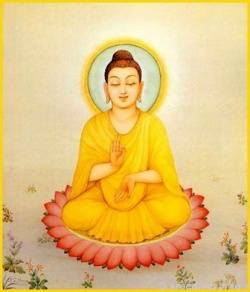Difference between revisions of "Ananta"
| Line 5: | Line 5: | ||
[[Endless]], {{Wiki|eternal}}, [[boundless]], limitless, {{Wiki|infinite}}, or innumerable. | [[Endless]], {{Wiki|eternal}}, [[boundless]], limitless, {{Wiki|infinite}}, or innumerable. | ||
| − | [[Anantacharitra]] ( Jpn [[Muhengyo]]) is the [[name]] of one of the four [[bodhisattvas]] who appear in the "[[Emerging from the Earth]]" (fifteenth) chapter of the [[Lotus Sutra]] as the leaders of the [[Bodhisattvas of the Earth]]. [[Bodhisattva]] [[Anantacharitra]] is translated as [[Bodhisattva Boundless Practices]]. ''[[Charitra]]'' means {{Wiki|action}}, conduct, or good conduct. The "Introduction" (first) chapter of the [[Lotus Sutra]] refers to ''[[Anantamati]]'', one of eight princes the [[Buddha]] [[Sun Moon Bright]] had fathered as a {{Wiki|king}} before leaving {{Wiki|secular}} [[life]]. [[Anantamati]] is translated as [[Immeasurable]] {{Wiki|Intention}}. ''Mati'' means {{Wiki|intention}}, resolution, or {{Wiki|mind}}. ''Ananta-nirdesha-pratishthana'' is the type of [[samadhi]], or [[meditation]], that [[Shakyamuni Buddha]] entered into before preaching the [[Lotus Sutra]], according to the "Introduction" chapter of the [[sutra]]. ''[[Ananta-nir-desha-pratishthana]]'' is interpreted in [[Kumarajiva's]] {{Wiki|Chinese}} version of the [[Lotus Sutra]] as the [[samadhi]] of the origin of [[immeasurable]] meanings. ''[[Nirdesha]]'' means description, elucidation, or explanation, and ''[[pratishthana]]'' means basis, foundation, dwelling, or support. | + | [[Anantacharitra]] ( Jpn [[Muhengyo]]) is the [[name]] of one of the four [[bodhisattvas]] who appear in the "[[Emerging from the Earth]]" (fifteenth) chapter of the [[Lotus Sutra]] as the leaders of the [[Bodhisattvas of the Earth]]. [[Bodhisattva]] [[Anantacharitra]] is translated as [[Bodhisattva Boundless Practices]]. ''[[Charitra]]'' means {{Wiki|action}}, conduct, or good conduct. The "Introduction" (first) chapter of the [[Lotus Sutra]] refers to ''[[Anantamati]]'', one of eight princes the [[Buddha]] [[Sun Moon Bright]] had fathered as a {{Wiki|king}} before leaving {{Wiki|secular}} [[life]]. [[Anantamati]] is translated as [[Immeasurable]] {{Wiki|Intention}}. ''[[Mati]]'' means {{Wiki|intention}}, resolution, or {{Wiki|mind}}. ''[[Ananta-nirdesha-pratishthana]]'' is the type of [[samadhi]], or [[meditation]], that [[Shakyamuni Buddha]] entered into before preaching the [[Lotus Sutra]], according to the "Introduction" chapter of the [[sutra]]. ''[[Ananta-nir-desha-pratishthana]]'' is interpreted in [[Kumarajiva's]] {{Wiki|Chinese}} version of the [[Lotus Sutra]] as the [[samadhi]] of the origin of [[immeasurable]] meanings. ''[[Nirdesha]]'' means description, elucidation, or explanation, and ''[[pratishthana]]'' means basis, foundation, dwelling, or support. |
</poem> | </poem> | ||
{{R}} | {{R}} | ||
Revision as of 07:24, 27 January 2014
ananta
無辺・無量 (Skt, Pali; Jpn muhen or muryo )
Endless, eternal, boundless, limitless, infinite, or innumerable.
Anantacharitra ( Jpn Muhengyo) is the name of one of the four bodhisattvas who appear in the "Emerging from the Earth" (fifteenth) chapter of the Lotus Sutra as the leaders of the Bodhisattvas of the Earth. Bodhisattva Anantacharitra is translated as Bodhisattva Boundless Practices. Charitra means action, conduct, or good conduct. The "Introduction" (first) chapter of the Lotus Sutra refers to Anantamati, one of eight princes the Buddha Sun Moon Bright had fathered as a king before leaving secular life. Anantamati is translated as Immeasurable Intention. Mati means intention, resolution, or mind. Ananta-nirdesha-pratishthana is the type of samadhi, or meditation, that Shakyamuni Buddha entered into before preaching the Lotus Sutra, according to the "Introduction" chapter of the sutra. Ananta-nir-desha-pratishthana is interpreted in Kumarajiva's Chinese version of the Lotus Sutra as the samadhi of the origin of immeasurable meanings. Nirdesha means description, elucidation, or explanation, and pratishthana means basis, foundation, dwelling, or support.
